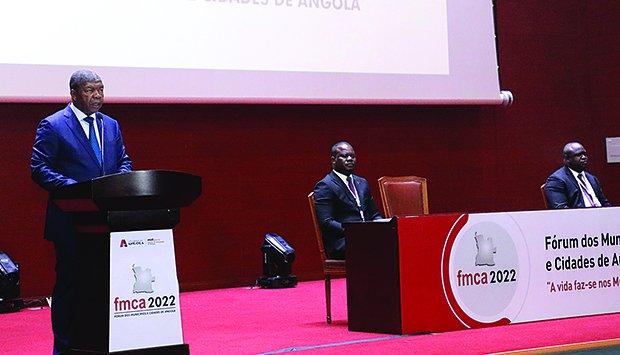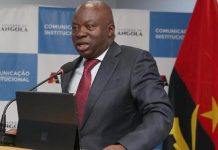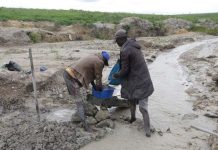Africa-Press – Angola. The President of the Republic assured, this Thursday, that the Executive will increase the mechanisms for community participation in the analysis of major issues, through approximation of municipal administrations, to solve citizens’ problems.
João Lourenço, who was speaking at the opening of the Forum of Municipalities and Cities of Angola, said it was an initiative to further democratize governance and promote active and participatory citizenship among citizens.
It also intends, according to the Head of State, to stimulate healthy competition between those who manage to have less garbage, streets and sidewalks in good condition, attractive public squares and gardens, painted buildings, sports courts and other spaces for sports and leisure citizens, among others.
The Executive affirms its commitment to the continuity of the program and its extension to more municipalities, giving greater relevance to the component of productive inclusion.
The President of the Republic launched the challenge of institutionalizing the Best City, Best Municipality Award, a way of promoting and recognizing merit and excellence in the management of municipalities and cities in the country.
This dynamic, according to João Lourenço, is only possible if everyone understands the imperative need to make the municipality the center of national development and the primary unit of organization of the territory, increasing the capacity for intervention so that local issues are resolved locally.
“It is with this vision that the Executive decided to submit to the National Assembly the Draft Law for the New Political-Administrative Division of the country, whose approval will result in the creation of two more provinces, arising from the division of the current provinces of Moxico and Cuando Cubango” , announced.
The country, he pointed out, will have a number of municipalities much higher than the current 164: “What we think is recommendable, taking into account the large extension of the national territory and projections on population growth”.
The President declared that, with these adjustments in the Political-Administrative Division of the country, it is intended to promote the harmonious development of the national territory, reduce local asymmetries and manage each part of the country in a more effective and full way, placing the management bodies of the municipalities closer to citizens.
“Citizens demand more and better services, and it is our duty and obligation, as public servants, to understand their legitimate aspirations and adapt our style of work and organization to better respond to challenges, seeking solutions to different problems, if we want respond positively to the aspirations of the populations”, he said.
More attention to resources
For João Lourenço, he defends more attention to the resources that the country has in the Civil Service, ensuring the continuous training of staff and creating incentives to attract the best to the municipalities.
“It is imperative and urgent that the work be completed on a differentiated remuneration for employees placed in less attractive municipalities, through the attribution of subsidies that encourage them to settle in these territorial circumscriptions, contributing to their development”, he underlined. improving the population’s human development index largely depends on the investment made in education and health. and Education. This effort will continue, just as we must continue to invest in the construction of schools and health units in close proximity”, he guaranteed.
The focus on these two sectors, he continued, is very relevant for the development of the country and, therefore, should continue to be the initial and continuous training of teachers and health professionals in specialized centers of reference and the continuous improvement of working conditions. so that they can carry out their work more efficiently.
He also asked for greater attention to the management of cities, neighbourhoods, towns and villages and to promote the urban development of the municipalities, starting with the elaboration of Municipal Master Plans, in order to discipline the use of land for different purposes, but particularly for housing and for production of food goods.
The Executive, he made it known, has several initiatives underway that aim to increase the internal capacity for the production of goods and services, as is the case of PLANAGRÃO. “However, there are still some barriers in the implementation of private investment projects that must be removed so that we can promote employability in rural communities and beyond”, he said.
Takes the view that provincial governments and municipal administrations should be the main facilitators of private investment in their territories, creating the objective conditions for private entrepreneurs to be able, with observance of the law and respect for the environment, to implement projects that contribute to an increase in domestic production of goods and services and the supply of jobs.
The provinces with agricultural potential, he said, should have a strategy for optimizing idle land and facilitate access to them by investors who have viable projects for food production, especially for the cultivation of grains and cattle raising.
“Only by acting consistently will we be able to guarantee the food and nutritional security of the population and balance the country’s balance of payments”, he concluded.
Balance of government action for the 2017-2022 term
The balance of government action for the 2017-2022 term showed that the set of initiatives by the Executive, especially in the areas of local development, generally corresponded to the wishes of the population, “although not all projects have been completed”, recognized the President.
João Lourenço understands that the vote of confidence given by the majority of citizens should result in greater readiness for work, more audacity and insight in the search for solutions to solve the population’s problems.
This confidence, he added, should also result in better interaction and communication with citizens, civil society organizations, churches, businessmen and other private institutions, “listening to them and welcoming their ideas and initiatives that contribute to the guarantee of social peace and the economic and social development of communities”, he stressed.
The Head of State referred that the challenges of local governance in the current context call for a new way of being of the State. For this reason, he added, the Executive is working towards having a more agile, more deconcentrated public administration so that the territory can be better managed and implement projects that are more suited to the real needs and priorities of the provinces and municipalities.
It guided the ministerial departments to focus more and more on their mission of designing and proposing public policies, training local bodies to execute them, supervising their implementation, ensuring compliance with the established objectives and limiting themselves to executing only those projects whose size and complexity justify it.
“The time has come to implement an effective administrative and financial deconcentration, which transforms municipalities into the center of national development, which will become a reliable and safe antechamber for the institutionalization of local authority”, he maintained.
He pointed out the gains of the process of administrative and financial deconcentration, especially in the field of financial autonomy of municipal administrations, through the collection mechanism and rapid return of revenue through the Portal do Munícipe, with the return of Property Tax to municipalities being in progress, in this sense , under the terms of the new Property Tax Code.
Financial deconcentration, he continued, is an essential condition for municipalities to have a real capacity to respond satisfactorily to the needs of citizens and companies. We need to work harder on the municipal revenue collection process, exploring the enormous potential that exists in all municipalities.
The President expects more revenue from the municipalities from the Central Administration, which must promote effective local development.
“Municipalities have to do more and not just wait for revenue from the Central Administration, they must promote effective local development, provide better services and create conditions for attracting private investment”, he said.
He recalled that when the Integrated Program for Intervention in Municipalities (PIIM) was launched in 2019, skepticism reigned about the technical capacity and degree of preparation of municipal administrations to satisfactorily implement the plan.
For João Lourenço, the 2689 projects, of which 869 have been completed and 669 with a physical execution above 70 percent, the more than 30,000 temporary jobs created, “only confirm how unfounded our reluctance was to not transferring, for a longer time, more powers to the municipalities”, he said.
The PIIM, he added, has been a true school for learning values for municipal administrations, with regard to the rigor of budget execution, “to the point that we have no doubts regarding its continuity, and the Executive is currently looking for solutions of secure financing for the II Phase of the Integrated Intervention Plan in Municipalities, which is expected to be more focused on supporting infrastructures for local production and urban development, depending on the profile and potential of each municipality”, he underlined.
The President of the Republic referred that the Integrated Program for Local Development and Combating Poverty and the Kwenda Social Protection Strengthening Program are currently a reference for programs to combat situations of social vulnerability and promote local development.
“So far we have registered 835,365 households in 56 municipalities and 8,396 villages, with more than thirty billion kwanzas having been disbursed so far. Kwenda should not be seen as a mere state welfare program tending to generate dependence on beneficiaries in relation to the State. Practice has shown that beneficiaries invest part of the money from social monetary transfers in small local businesses”, he said.
The Forum of Municipalities and Cities of Angola is a collegiate consultation body of the President of the Republic that aims to promote and boost community development in the country. It is also an opportunity for dialogue and exchange of experiences between public managers at central and local levels, which serves to regularly assess the implementation of policy measures adopted within the scope of the reform of the State’s local administration.
The President of the Republic considered the motto of the Forum quite successful: “it is crucial that there are no doubts that certain tasks are better carried out when carried out by those who are closest to the population and live directly with their problems”.
The Minister of Territorial Administration, Dionísio da Fonseca, said that this eighth edition is intended to assess the implementation of different policy measures adopted within the scope of the Reform of local State construction and put the actions into perspective for the coming years.
For More News And Analysis About Angola Follow Africa-Press






